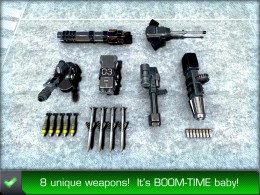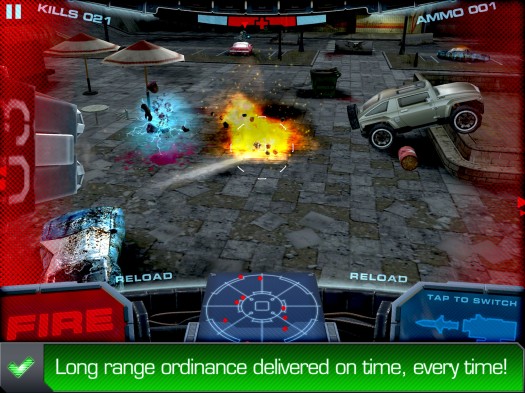![]() “Protect the civilians. Obliterate the enemy."
“Protect the civilians. Obliterate the enemy."
These are among the first words you’ll read as you load into Razor: Salvation (Free), Blowfish Studios and Crescent Moon‘s new wave-based turret shooter. Suffice to say, that’s about all the description that you’ll need to understand most of what the game has to offer. Aliens are invading the planet, and you’ve got to stop them by defending a static position, gunning aliens down, and rescuing survivors for as long as you can before you die. And with some simple first-person turret-style shooting controls that require you to do no more than drag your viewpoint and tap a button to shoot, doing so is pretty straightforward to boot.
Razor doesn’t veer too far from the blueprint set out by the increasingly-common arcade games that dot the App Store’s various sales charts. Simple controls? Check. Easy to learn, hard to master game design? Check. Wave-based, increasingly-difficult, randomly-populated levels? Check. Rotating bonus mini-objectives? Check. Persistent currency used to purchase upgrades in pursuit of pleasure from progress? Check. In many ways, it’s as though Crescent Moon merely took a industry-wide “2012 iOS Arcade Game" framework popularized by Jetpack Joyride and changed little more than a few variables.
Because of its systemic similarities to most other iOS arcade games, Razor’s uniqueness is largely derived from its subject matter and its core gameplay mechanic. Strangely enough, the post-apolocalyptic sci-fi alien shoot ’em up genre is somewhat underrepresented on iOS, and that gives Razor one area of distinction. By and large, though, the game’s main selling point is its simple first-person shooter gameplay. With a nice selection of guns ranging from the standard, like the minigun and missle launcher, to the not-so-standard, like the railgun and other exotic treats that await those who collect enough of the game’s in-game currency Razorbucks, you’re certain to find a favored toy that looks and feels fun to use.
There is an upgrade system too, but it’s fairly run of the mill. You earn money by completing side-missions and main missions alike (as well as through the standard sell-your-soul promotions), and the money can then be used through the in-game store to purchase new weapons, trinkets, and all manner of easter eggs. Better gear helps you fight longer and harder, which earns you more money and in turn allows you to buy better gear. Egads: stop the presses!
 Yes, at first glance, Razor seems far too simplistic and somewhat uninspired. But in spite of or more likely because of its simplicity, the game becomes oddly enthralling if you dig in long enough. Like Crescent Moon’s other titles Raid Leader and Paper Monsters, Razor is designed to do one thing and do it very well. The shooting is responsive enough if not lacking a little but of punch, but the reload times are nail-biting in that they ellict the right kind of frustration and fear as you scramble to switch weapons while a horde of foes surrounds you. However, this only becomes apparent once you’ve blasted through the first ten or so waves of enemies: until things get hectic, many may find the game a little slow and plodding.
Yes, at first glance, Razor seems far too simplistic and somewhat uninspired. But in spite of or more likely because of its simplicity, the game becomes oddly enthralling if you dig in long enough. Like Crescent Moon’s other titles Raid Leader and Paper Monsters, Razor is designed to do one thing and do it very well. The shooting is responsive enough if not lacking a little but of punch, but the reload times are nail-biting in that they ellict the right kind of frustration and fear as you scramble to switch weapons while a horde of foes surrounds you. However, this only becomes apparent once you’ve blasted through the first ten or so waves of enemies: until things get hectic, many may find the game a little slow and plodding.
Thankfully, like the aformentioned titles, Razor does throw a few unique ideas into the mix to keep things interesting. Beyond the gameplay itself, one of its more novel features is its region-centric leaderboards. When you first create a profile, you’re asked to choose your home country. This automatically enrolls you in a “faction", and as a member of a faction, your high scores contribute to the faction’s total. Leaderboards display scores on a faction-vs.-faction basis, and this makes the game more interesting as you develop a sense of pride and belonging to your faction. You’re not just contributing to your own high score but the high score of your nation. Plus, were that not enough, you can even make your own factions with friends, like guilds of sorts, that can then compete with other factions. It’s a simple idea, but a brilliant one.
And that really sums up Razor: Salvation. There is no denying it is an incredibly simple game with incredibly simple ideas. Heck, its rudimentary 3D graphics make matters even worse, especially when compared to its more artistically-diverse 2D contemporaries which play to our retro-era nostalgia. There’s no denying that the presentation lacks a certain amount of personality that hurts the overall package to a certain extent. The game does not make a great first impression.
But like the best iOS titles, the game’s simplicity belies its lasting appeal—the timeless “just one more round" feeling is there with Razor, and it’s because of that hook and a few of the game’s small but important features that it can burrow its way into your brain and illicit the craving for earning just a few more Razorbucks. Give it enough time to sink in, and you’ll find a solid endless shooter here—albeit one that will likely get much better with updates.

